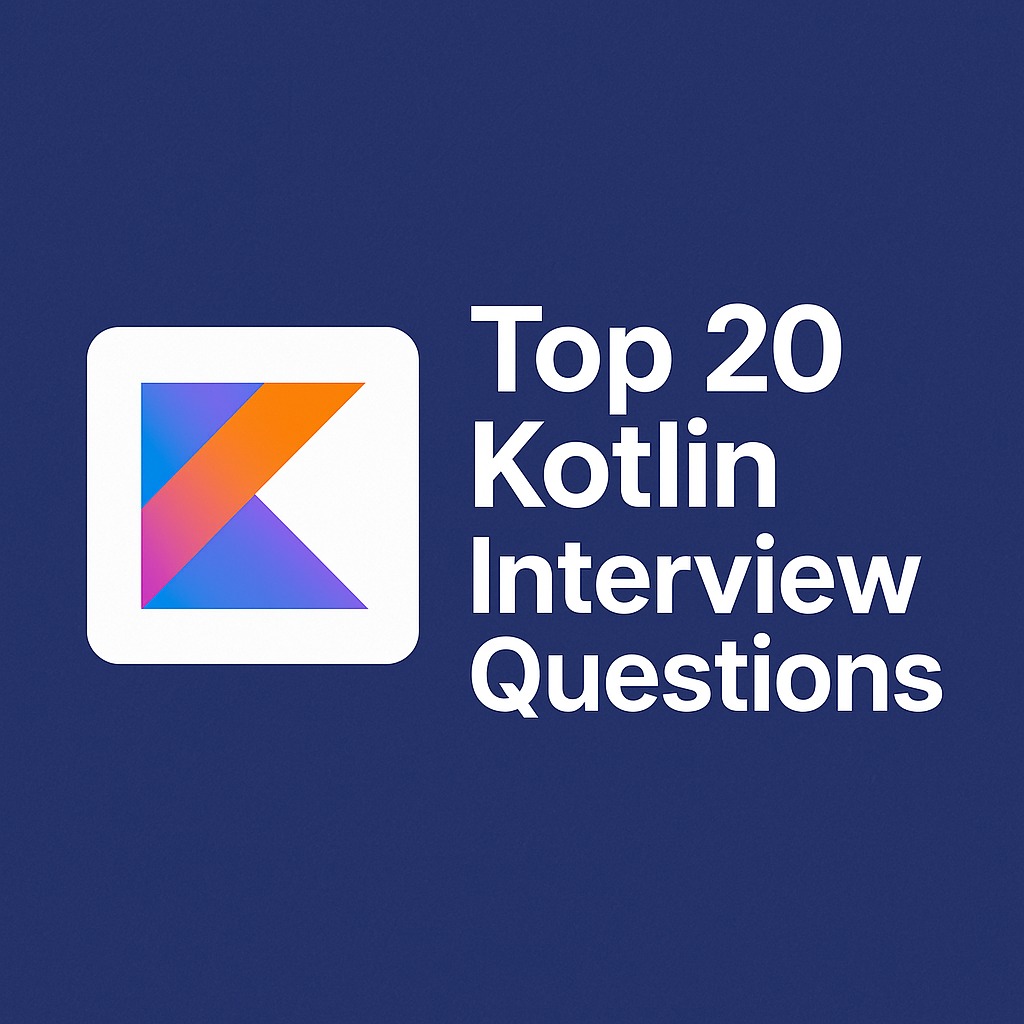Top 20 Kotlin Interview Questions and Answers
Kotlin has gained immense popularity as a modern programming language, especially for Android development and backend services using Spring Boot.

Kotlin has gained immense popularity as a modern programming language, especially for Android development and backend services using Spring Boot. If you are preparing for a Kotlin interview, here are the top 20 Kotlin questions with answers to help you succeed.
1. What is Kotlin?
Answer: Kotlin is a modern, statically typed programming language developed by JetBrains. It is fully interoperable with Java and is widely used for Android development, backend applications, and multiplatform projects.
2. How is Kotlin different from Java?
Answer:
Concise – Kotlin reduces boilerplate code compared to Java.
Null Safety – Eliminates null pointer exceptions with nullable and non-nullable types.
Coroutines – Supports lightweight threads for asynchronous programming.
Smart Casts – Automatically detects variable types without explicit casting.
3. What are the key features of Kotlin?
Answer:
✅ Interoperability with Java
✅ Null Safety
✅ Type Inference
✅ Extension Functions
✅ Coroutines for Asynchronous Programming
✅ Smart Casts
✅ Data Classes
4. What is a data class in Kotlin?
Answer: A data class is a special class used to store data with automatic generation of equals(), hashCode(), and toString() methods.
Example:
data class User(val name: String, val age: Int)5. What are extension functions in Kotlin?
Answer: Extension functions allow you to add new functionality to existing classes without modifying their source code.
Example:
fun String.reverseText(): String = this.reversed() println("Kotlin".reverseText()) // Output: niltoK 6. How does Kotlin handle null safety?
Answer: Kotlin provides nullable (?) and non-nullable types to avoid null pointer exceptions.
Example:
var name: String? = "Kotlin" name = null // Allowed println(name?.length) // Safe call operator
7. What is the Elvis operator (?:) in Kotlin?
Answer: It provides a default value when a nullable variable is null.
val name: String? = null val length = name?.length ?: 0 // If null, assign default value 0
8. What are Coroutines in Kotlin?
Answer: Coroutines are lightweight threads used for asynchronous programming in Kotlin.
Example:
import kotlinx.coroutines.*
fun main() = runBlocking {
launch {
delay(1000L)
println("Coroutine executed")
}
println("Main function running")
}
9. Difference between val and var in Kotlin?
Answer:
val (Immutable) – Read-only, cannot be reassigned.
var (Mutable) – Can be changed after assignment.
val name = "Kotlin" // Cannot be changed var age = 25 // Can be changed
10. What is the lateinit keyword in Kotlin?
Answer: It is used to initialize a non-null variable later without using nullable types.
lateinit var username: String fun initUser() {
username = "BindTheLogic"
println(username)
}
11. What are sealed classes in Kotlin?
Answer: A sealed class restricts inheritance, allowing only a predefined set of subclasses.
sealed class Shape class Circle(val radius: Double) : Shape() class Rectangle(val width: Double, val height: Double) : Shape()
12. What is the difference between == and === in Kotlin?
Answer:
== – Checks structural equality (content comparison).
=== – Checks referential equality (memory reference).
val a = "Kotlin"
val b = "Kotlin"
println(a == b) // true (content is the same)
println(a === b) // true (same memory reference)
13. What is an object declaration in Kotlin?
Answer: An object declaration creates a singleton instance of a class.
object Singleton {
fun greet() = "Hello from Singleton"
}
println(Singleton.greet())
14. What are inline functions in Kotlin?
Answer: Inline functions reduce memory overhead by avoiding object creation for higher-order functions.
inline fun greet(name: String, action: () -> Unit) {
println("Hello, $name")
action()
}
greet("Kotlin") {
println("Inside lambda")
}
15. What is the difference between Array and List in Kotlin?
Answer:
Array – Fixed-size, mutable data structure.
List – Immutable by default but can be mutable using MutableList.
val numbers = arrayOf(1, 2, 3) // Array
val list = listOf(1, 2, 3) // Immutable List
val mutableList = mutableListOf(1, 2, 3) // Mutable List
16. What is a companion object in Kotlin?
Answer: A companion object allows defining static-like functions in Kotlin classes.
class MyClass {
companion object {
fun create() = MyClass()
}
}
val obj = MyClass.create()
17. How does Kotlin handle default parameters in functions?
Answer: You can assign default values to function parameters.
fun greet(name: String = "Guest") {
println("Hello, $name")
}
greet() // Output: Hello, Guest
greet("Alice") // Output: Hello, Alice
18. What is the difference between mapOf and mutableMapOf?
Answer:
mapOf() – Immutable key-value pairs.
mutableMapOf() – Allows modifying the map.
val immutableMap = mapOf(1 to "One", 2 to "Two")
val mutableMap = mutableMapOf(1 to "One", 2 to "Two")
mutableMap[3] = "Three" // Allowed
19. How do you define a higher-order function in Kotlin?
Answer: A function that takes another function as a parameter.
fun operate(num: Int, action: (Int) -> Int): Int {
return action(num)
}
val result = operate(5) { it * 2 } // Output: 10
20. What is flow in Kotlin?
Answer: Flow is used for handling streams of data asynchronously, similar to RxJava.
import kotlinx.coroutines.flow.*
fun numbersFlow(): Flow<Int> = flow {
for (i in 1..5) {
emit(i) // Emits values one by one
}
}
Conclusion
Mastering these Kotlin interview questions will boost your confidence in Android development, backend (Spring Boot), and multiplatform projects. Stay updated with Kotlin features and keep practicing! 🚀